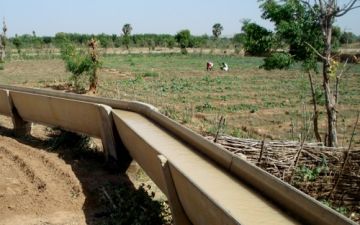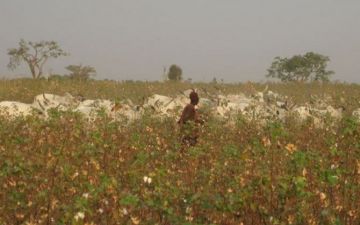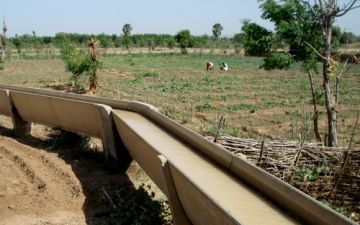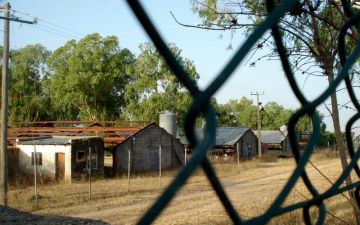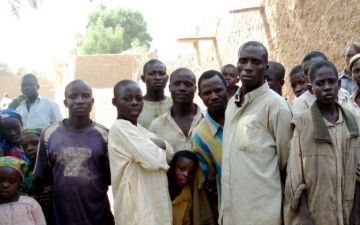Nigeria
In the Kano Maternity Ward
Families in Kano, Nigeria struggle to procure blood for mothers suffering from obstetric hemorrhage during delivery. A new blood bank next to the hospital offers hope.
This segment was produced by Outer Voices. The Outer Voices podcast series was made possible with the support of the Schulz Donor Advised Fund of Sonoma County.
Making Maternal Mortality in Nigeria Compelling Enough
Over 36,000 women in Nigeria die each year due to post-delivery complications. Dawn Sinclair Shapiro discusses documentary, "The Edge of Joy" which focuses on the pregnancy of several Nigerian women, with MediaGlobal.
Below, Director Dawn Sinclair Shapiro discusses her documentary with MediaGlobal. "The Edge of Joy" focuses on the pregnancy of several Nigerian women the day they go into labor. Find the article excerpted below.
Nigeria: Maternal health perspectives from the frontlines
Dawn Sinclair Shapiro sheds light on the challenges Nigeria faces in its effort to reduce material mortality.
The Edge of Joy - Trailer
In the U.S. 1 in 4,800 women die in childbirth. In Nigeria it is 1 in 18. In the one-hour documentary, The Edge of Joy, filmmaker Dawn Sinclair Shapiro closely follows an ensemble cast of Nigerian doctors, nurses, midwives and religious leaders as they battle the second highest maternal mortality rate in the world. The Edge of Joy is a character driven, cinematic expedition ranging from deep within Nigeria's semi-arid lands of the isolated Islamic north to the lush-savannahs of the volatile Christian south.
Farming and Famine in Nigeria
A generation ago, the African nation of Nigeria launched a plan to embrace modern farming. But today the country is more dependent than ever on imported food. To find out what went wrong with these agricultural efforts, reporter David Hecht travels to a Nigerian village he first visited in the 1980s.
Fast Food in Nigeria
Mr. Bigg's is the largest fast food chain in Africa's most populous country. This Nigerian chain, loosely modeled on McDonald's, offers hamburgers and French fries as well as local fare. But running a fast food operation is no easy feat in a country beset by mismanagement, corruption, and a lack of infrastructure. David Hecht reports.
African Famines Examined
Famines often occur during times of drought, but their causes go much deeper than a lack of rain. With East Africa now facing widespread hunger, we look back at a major food crisis that struck the Western African nation of Niger in 2005. Reporter David Hecht examines the roots of that crisis and finds some of them stretching across Niger’s border, to the neighboring country of Nigeria.
Niger: The Causes of Famine
Droughts and floods can cause food crises. But so can politics and economics. Reporter David Hecht examines the roots of the 2005 food crisis in the West African nation of Niger and why so many children starved to death despite an adequate harvest.
Little Keeps Nigeria From a Crisis of Hunger
The nation blessed with Africa's largest oil reserves and some of its most fertile lands has a problem. It cannot feed its 140 million people, and relatively minor reductions in rainfall could set off a regional food catastrophe, experts say.
Nigeria: Land Battles
For centuries, nomads from the Fulani ethnic group have driven their cattle across thousands of miles of African grazing lands, through countries including Mali, Niger, Chad, Cameroon and Nigeria. But Nigeria is Africa's most populated country. And more and more land there is being used for food production.
In the far north of Nigeria, the situation has put farmers and nomads at odds with each other. David Hecht reports from the small village of Yardanko.
Nigeria: Families Left Hungry
The first in a series of reports from around the world about food, food policy, and food security: Nigeria, a country that has historically enjoyed food surpluses. That was before vast oil reserves were discovered. Today Africa's most populous nation must use its revenues to import food–elbowing out impoverished neighbors in a precarious regional food market.
Correspondent: Fred de Sam Lazaro
Producer: Nicole See
Videographer: Tom Adair
Editor: Skip Davis



